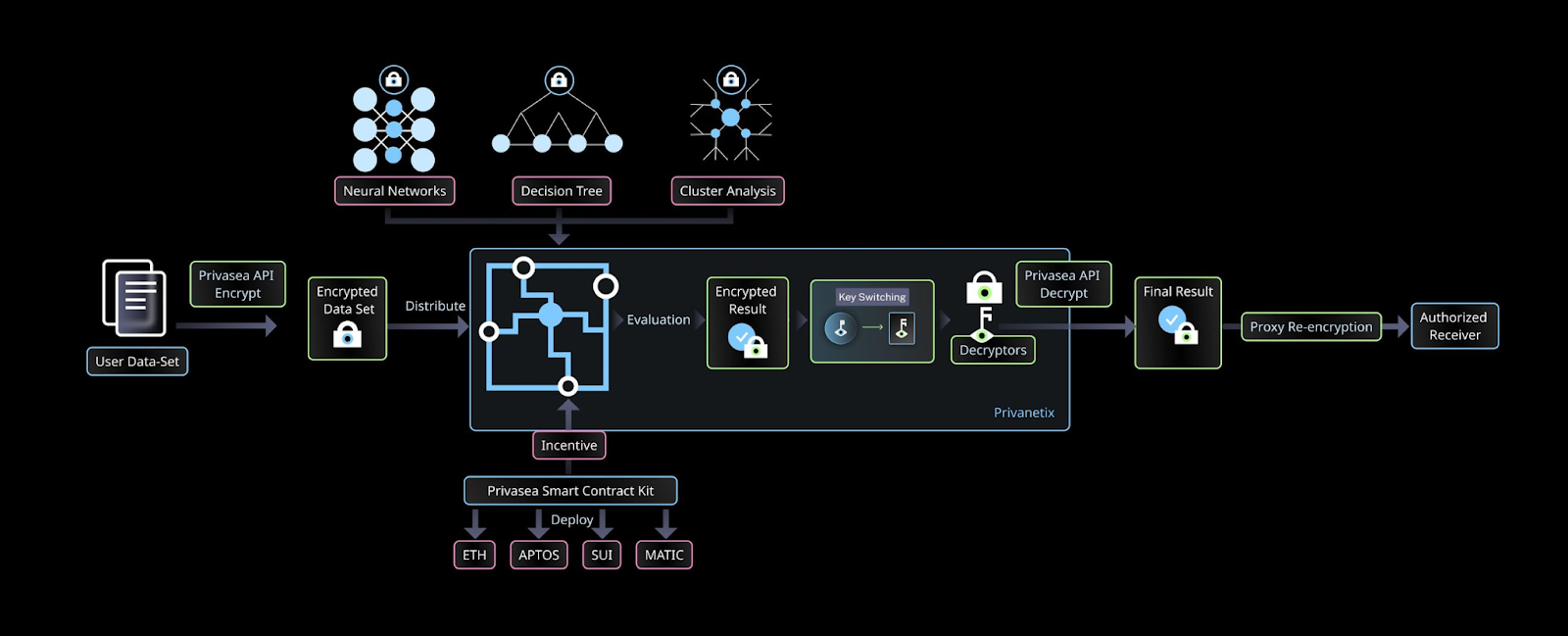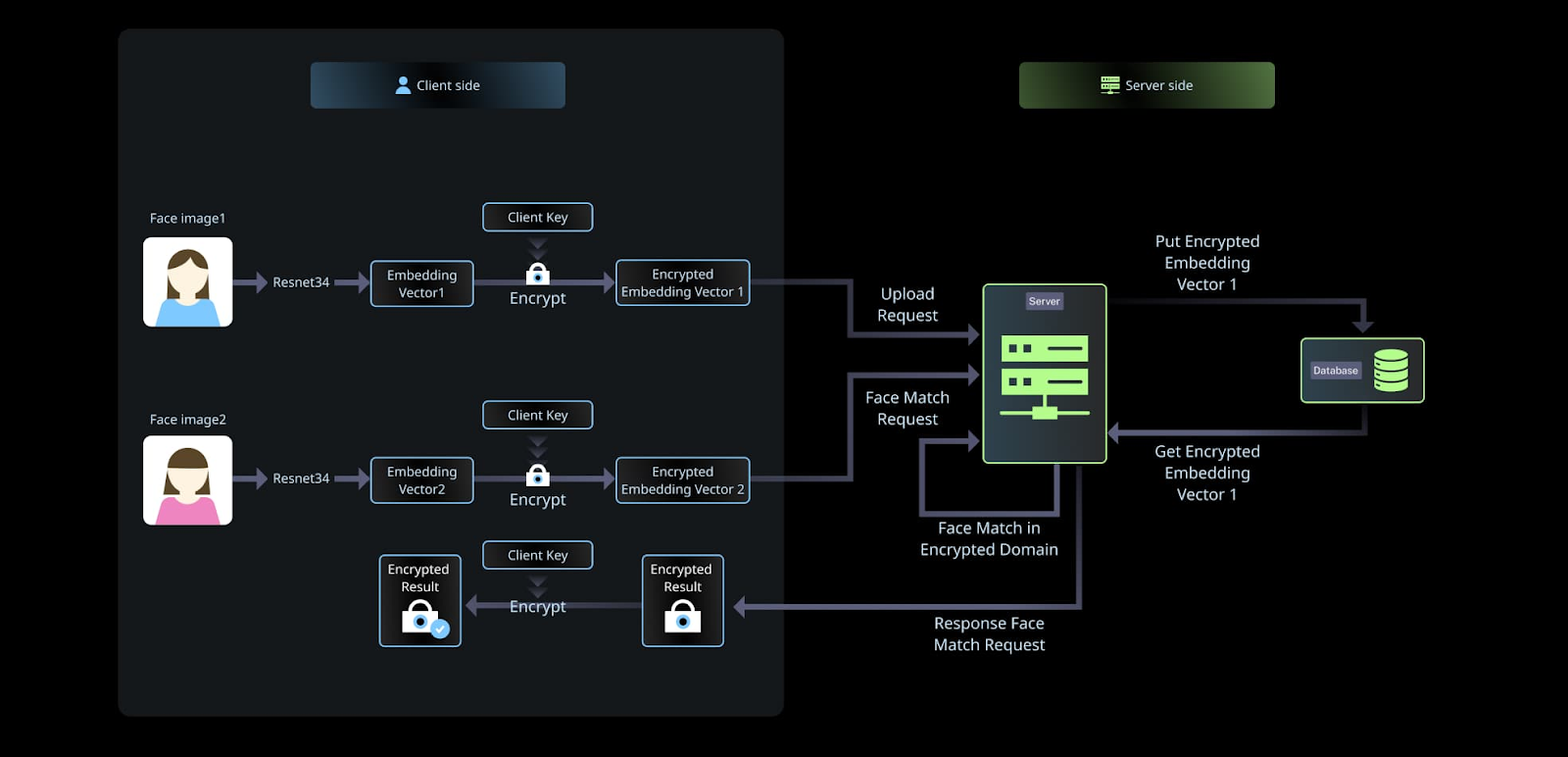MT Capital Research Report: Privasea, Introducing Fully Homomorphic Encryption into Mass Adoption
Original author: Xinwei, MT Capital
MT Capital has always been committed to investing in innovative companies with disruptive technological potential. We believe that the decentralized physical infrastructure network (DePIN) that combines fully homomorphic encryption (FHE) with AI is an important track for the future. FHE technology can perform calculations while keeping data encrypted, ensuring privacy and security throughout the data processing process. The combination of AI and DePIN can not only efficiently utilize external computing resources, but also perform complex data analysis and machine learning tasks without worrying about data leakage. Privasea's leading position and technological advantages in this field are highly consistent with MT Capital's investment strategy. We believe that by supporting Privasea, we will promote the development of the FHE AI DePIN track and contribute to the security and sustainable development of the global digital economy.
1. What is Fully Homomorphic Encryption (FHE)?
Fully Homomorphic Encryption (FHE) is a cryptographic technique that allows arithmetic or logical operations to be performed directly on ciphertext while keeping the data encrypted. This means that complex processing can be performed on encrypted data without decrypting it into plaintext, which is revolutionary in maintaining data privacy and security.
In traditional data processing scenarios, in order to perform calculations, data must first be decrypted, which exposes sensitive information and increases the risk of data theft or misuse. The application of FHE technology has completely changed all this. With FHE, encrypted data can be directly input into the calculation process, and the calculation results remain in encrypted form until they are needed to be decrypted. This feature is very important for industries that need to process sensitive data, such as finance, healthcare, and government departments.
FHE also makes it possible to outsource data processing without sacrificing data confidentiality. Enterprises can send encrypted data to third-party service providers for complex data analysis or machine learning tasks without worrying about data leakage, because the service provider cannot see the original data during the entire process.
2. Privasea: The first AI+DePIN network using FHE
Privasea uses FHE technology to provide data privacy and security, and uses AI and distributed network architecture to allow complex data processing and analysis while keeping the data fully encrypted. This means that users can perform machine learning and other advanced calculations without exposing the original data, which is impossible in traditional cloud computing and subverts privacy computing.
The Privasea platform uses several advanced FHE schemes, such as TFHE and CKKS, which provide high data privacy protection while ensuring computational accuracy and efficiency. Among them, the TFHE scheme supports fast bit operations within a single instruction cycle, while the CKKS scheme optimizes the ability to handle floating-point numbers, allowing Privasea to effectively support a variety of complex scientific research and commercial applications, such as financial analysis, medical data processing, and machine learning tasks.
In addition, Privasea has implemented a highly scalable distributed computing network, Privanetix. This network consists of multiple computing nodes, each of which can perform FHE operations and provide the necessary computing resources. This distributed architecture not only enhances the processing power of the platform, but also improves the redundancy and fault tolerance of the system, ensuring high availability and reliability of services. This integration of AI and distributed networks allows Privasea to handle advanced AI tasks such as deep learning, pattern recognition, and machine learning, which usually require huge computing power and high data protection. For example, users in the healthcare industry can use Privasea to safely analyze patients' sensitive data, predict diseases, and optimize treatment plans without worrying about violating data protection regulations.

Privasea also provides a unique smart contract suite that allows users to manage and automate data processing processes through smart contracts while keeping the data encrypted, including data verification, result output, and the allocation and reward of computing tasks. These smart contracts are executed on a distributed ledger, which not only ensures the transparency and traceability of the process, but also automates the allocation of incentives based on the computing resources provided by the nodes. This blockchain-based incentive mechanism further improves the participation and computing efficiency of the network, as each node is motivated to provide reliable services. This makes Privasea not only a data encryption and processing platform, but also a complete encrypted data ecosystem.
Through Privasea's API, developers can easily access this complex system and use its powerful functions to develop and deploy their own AI applications. These applications can use distributed networks to distribute computing loads while ensuring data integrity and security, which is especially important for blockchain applications that need to process large amounts of sensitive data.
3. Collaboration with Solana highlights the potential of Mass Adoption
Privasea pioneered the ImHuman application using FHE technology, which not only demonstrated the application of FHE in anti-sybil attacks, but also marked its mass adoption potential in the crypto space. Sybil attacks are a major threat in decentralized networks, especially in the field of airdrops, where attackers create a large number of false identities to manipulate the network or gain unfair advantages. The ImHuman application effectively combats such attacks in a secure and privacy-preserving manner.
Privasea plans to deploy its technology to the Solana network, becoming the first Proof of Human application on Solana. Solana's high performance and low latency make it an ideal blockchain platform to support Privasea's FHE technology and AI computing needs. This deployment will not only enhance the security of the Solana ecosystem, but also demonstrate the potential of FHE in Web3 applications. By running on Solana, Privasea's ImHuman application will be able to verify user identities more broadly, ensuring the security and reliability of the network while protecting user privacy.
The ImHuman app works by using the user's biometric data to create a unique digital identity. First, the user needs to scan their facial vector through the app's front camera, a process that is completed entirely on the user's device to ensure that sensitive data is not leaked. The data is then encrypted and converted into an NFT representing the user's encrypted biometric vector. This takes advantage of the characteristics of FHE, which is to perform complex calculations without decrypting the data, ensuring the security and privacy of the data.
During user identity verification, the ImHuman app scans the user's facial features again and compares the newly collected data with the encrypted data stored on the blockchain. This process also uses FHE technology to ensure that the data will not be decrypted during the verification process, thereby effectively avoiding the risk of data leakage. In addition, since each user's NFT is generated based on their unique biometrics, it is difficult to copy or forge, greatly increasing the difficulty of performing a Sybil attack.
Through the ImHuman application, Privasea not only provides a powerful tool to enhance the security of decentralized networks, but also demonstrates the feasibility of fully homomorphic encryption technology in real-world applications. This authentication method based on biometrics and FHE provides a secure and privacy-preserving solution for decentralized networks, making Privasea's ImHuman the first application with mass adoption potential in the FHE field. In addition, by issuing airdrop rewards to participants, ImHuman can also incentivize user participation and continued use, further promoting its widespread adoption. This innovative solution provides a new strategy to defend against Sybil attacks.
4. Comparison between Privasea and existing Proof of Human solutions
In the current Proof of Human scheme, projects such as Worldcoin and Human Protocol face compliance risks and privacy issues. Taking Worldcoin as an example, the results of a recent investigation by the Privacy Commissioner of Hong Kong showed that Worldcoin's operation in Hong Kong violated the Privacy Ordinance. The investigation found that people participating in the Worldcoin project need to collect facial and iris images through iris scanning to verify human identity, which involves serious personal data privacy risks. Therefore, the Privacy Commissioner of Hong Kong asked Worldcoin to stop collecting iris and facial images of citizens in Hong Kong.
Human Protocol verifies by collecting user task response data, interaction data, device and browser information, geographic location, and user behavior data. Although this data is anonymized and encrypted before use, it still involves the collection of a large amount of personal data, which poses certain privacy and compliance risks.
In contrast, Privasea is designed to pay more attention to user privacy protection. Privasea's DApp "ImHuman" uses FHE technology for user identity authentication, and does not need to collect sensitive information such as the user's face or iris image. The verification process is completely carried out on the user's mobile device, and the facial vector data is encrypted and will not be transmitted to any server. In this way, Privasea ensures the security of verification while also protecting the user's privacy to the maximum extent and avoiding the risk of data leakage.

Privasea not only leads in privacy protection, but also provides powerful data privacy and security solutions through the integration of FHE, DePIN and ZK technologies. These technologies enable Privasea to perform complex data processing and analysis without exposing user data, further reducing compliance risks. This unparalleled privacy protection and data security capabilities make Privasea stand out from the competition and become the industry-leading Proof of Human solution.
5. Accseal and Privasea work together to deepen privacy computing
Privasea has set new standards in privacy computing with its outstanding FHE, DePIN and ZK technical capabilities. As a pioneer in the field of AI DePIN, Privasea has set a new benchmark for data privacy and security through its innovative FHE machine learning (FHEML) solution, which seamlessly combines distributed computing networks with advanced security measures. The DApp "ImHuman" introduced by Privasea uses FHE technology to securely execute "Proof of Humanity" (PoH), encrypting facial vector data directly on the user's mobile device without transmitting it through the server, thereby greatly enhancing privacy protection and the security of user data.

In this context, Privasea has reached a strategic cooperation with Accseal to further strengthen its technological advantages. As a leading company in hardware acceleration for privacy computing, Accseal will provide hardware acceleration support for Privasea to improve the efficiency and performance of its FHE operations. The two parties will jointly explore the possibility of integrating ZK and FHE technologies to improve the efficiency of privacy computing and expand its application scope.
Through this cooperation, Privasea not only demonstrated its leadership in the FHE field, but also took its DePIN project to a new level. Accseal will develop new hardware acceleration products to provide computing acceleration support for upper-layer applications such as Privasea, further promoting the development of privacy computing technology. The cooperation between the two parties heralds new breakthroughs in the field of privacy computing, especially in the DePIN project, which will be more extensive and in-depth.
MT Capital
MT Capital is a global investment institution managed by a team of senior investors, focusing on investing in innovative Web3 projects around the world, covering the United States, Hong Kong, Dubai and Singapore. Our main investment areas include: 1) Mass adoption: decentralized social platforms, games, applications and DEPIN, which are key to promoting the spread of Web3 technology to a wide range of user groups; 2) Crypto native infrastructure: We focus on investing in public chains, protocols and other infrastructure that support and strengthen the ecosystem, as well as native DeFi solutions. In addition, our team has many years of professional experience in secondary trading.
Official website: https://mt.capital/
Twitter: https://twitter.com/mtcap_crypto
Medium: https://medium.com/@MTCapital_US



